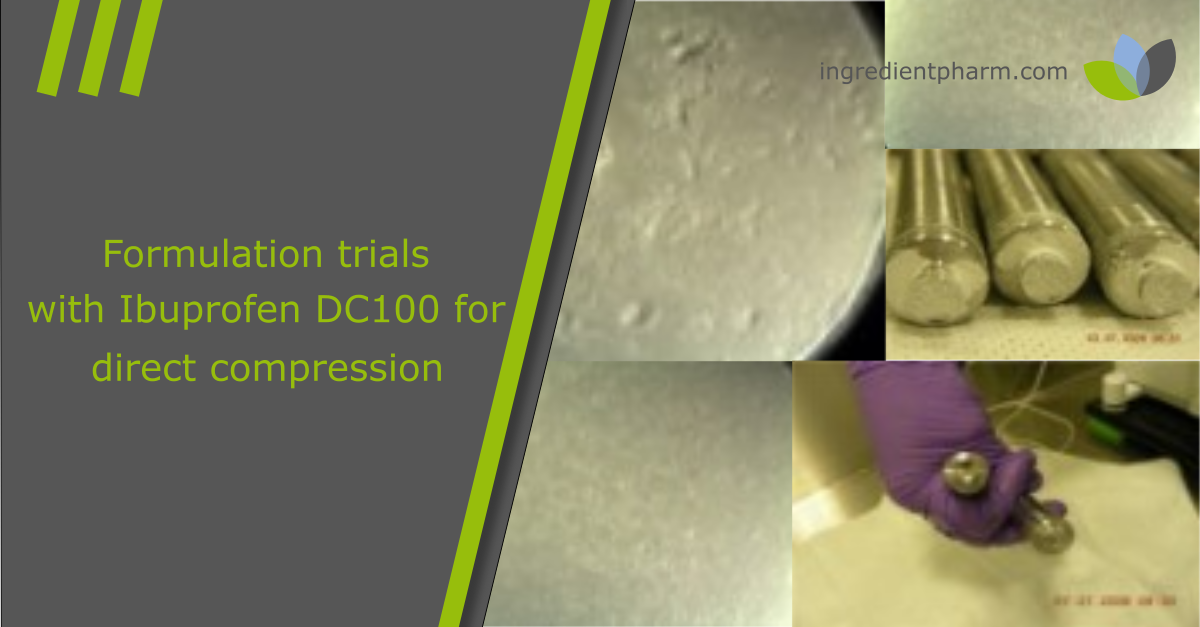Formulation trials with Ibuprofen DC100 for direct compression
Before getting into the formulation trials with Ibuprofen, let’s have a look on the global importance of Ibuprofen. Indeed, Ibuprofen is a popular drug for treating for treating fever, pain or inflammation. In numbers the global Ibuprofen market is about USD573 million [1] with a steady rise and a CAGR of 4.8% [2]. Generally, the drug uptake might be realized intravenously or orally. Keeping the oral uptake in focus, formulations of marketed products describe dosage forms, such as tablets, capsules, sachets or stick packs. By a matter of fact, most formulations are processed through compaction and compression of the drug in the solid dosage form. This is actually where Ibuprofen shows the main issue. Compression of Ibuprofen demands sophisticated treatment of the drug to achieve compressibility. Hence, long compression cycles are critical as the drug tends to stick after a while due to the low melting point and especially with using low compression forces leads into problems.
A simple attempt …
So, a simple attempt might obviously solve this issue. By granulating Ibuprofen, the drug is transferred into a novel physical form. Consequently, IPC Process-Center GmbH & Co. KG (Dresden/Germany) developed a granulation process on patented technology which allows granulation without further excipients. Thus, the chemical properties of Ibuprofen are not only unchanged – the new granule Ibuprofen DC100 can even be used to substitute conventional Ibuprofen in respective formulations while keeping the registered composition in the outer phase. Furthermore, granules are by nature better applicable for coating and layering processes with further excipients. Resultingly, this allows simplified taste-masking and targeted drug release profiles. A deeper insight into higher efficiency of production processed can be found in further application notes.
Expert’s opinion
Ibuprofen shows stickiness behavior which stresses the compression process in tableting. Take the granulated Ibuprofen DC100 and get rid of that. It will also simplify further coating and layering.
Formulation trials with Ibuprofen
Let’s now compare tablet formulations of Ibuprofen and the granulated form of the drug, illustrated by Ibuprofen DC100. Thereby, a focus will be set on the compression runs, which turned out to be an issue of the conventional drug.
First, formulation 1 is an Ibuprofen common formulation including Microcrystalline Cellulose (MCC), Silica (SiO2), Magnesium Stearate (Mg Stearate) and a disintegrant. The composition can be found in table 1. Second, formulation 2 is based on the granulated form of the drug Ibuprofen DC100, employing MCC, SiO2, Mg Stearate and a disintegrant. As a result, both formulations will result in a tablet of about 250 mg in weight.
| Formulation 1 | % |
| Ibuprofen common formulation including MCC/SiO2/disintegrant | 99.5 |
| Mg stearate | 0.5 |
| Sum | 100 |
Table 1: formulation 1 based on conventional Ibuprofen.
| Formulation 2 | % |
| Ibuprofen DC100 | 85.0 |
| + MCC/SiO2/disintegrant | 14.5 |
| Mg stearate | 0.5 |
| Sum | 100 |
Table 2: formulation 2 based on granulated Ibuprofen DC100.
Compression runs
Compression runs were conducted on both formulations. The results on the tablet mass, compression force fluctuation and crushing strength differ whereas formulation 2 clearly shows the better performance. In the same way, formulation 2 exhibits a lower compression force fluctuation and a lower crushing strength compared to formulation 1. In like manner the stickiness to the punch was investigated over a certain time frame. The conventional Ibuprofen in formulation 1 was observed for 5.5 hours and shows an increasing stickiness. After 5.5 hours the process was stopped. However, the granules from Ibuprofen DC100 in formulation 2 do not show any stickiness to the punch even after 10 hours. So, what is the effect of the obviously distinguishable stickiness character of both formulations?
| Parameter | formulation 1 | formulation 2 |
| Tablet mass, S_rel (%) | 0.9 – 1.4 | 0.4 – 0.8 |
| Compression force fluctuation | medium | low |
| Crushing strength, S_rel (%) | 10.4 | 7.4 |
| Sticking to punch | Increasing, process stopped after 5.5 hours | no (after 10 h) |
Table 3: Parameters of the compression runs.
Surface properties of Ibuprofen tablets
Shedding some light on the tablets’ surface, a more pronounced roughness is noted for formulation 1. Due to the absence of stickiness in formulation 2, the latter tablet’s surface seems more homogeneous with a clear and even structure. For instance, figure 1 shows the rough surface of formulation 1 on the left side, and the smooth surface of formulation 2 on the right side. Conversely, the punches carry more material when used for formulations 1 than for formulation 2. Obviously, there is a quality problem which might cause a lower yield of production due to a defective surface structure.

Figure 1: Tablet surface of Ibuprofen formulation 1 (left) and Ibuprofen DC100 formulation 2 (right).

Figure 2: Sticky drug at the punch at the end of the run. Ibuprofen formulation 1 (left) and Ibuprofen DC100 formulation 2 (right).
Summary
Finally, formulation trials with Ibuprofen DC100 for direct compression had been performed.
Apart from this study, formulations based on conventional Ibuprofen drug still make up most of the marketed products. Not only to point out further formulations options towards new and easier attempts, but also to emphasis the advantages of granulated drugs, the processing characteristics are investigated.
Especially, granulated Ibuprofen DC100 – as a different physical form of that drug – allows easier compression in production cycles. Thus, it avoids main drug issues such as stickiness during compression. Above all it might reduce loss in yield. Therefore, Ibuprofen DC100 might turn out to be the better drug for oral formulations.
References
[1] Global Ibuprofen Market Size to Grow at 2-3 Percent CAGR by 2023, Says Beroe Inc
[2] Ibuprofen-API-Markt | 2022 – 27 | Branchenanteil, Größe, Wachstum – Mordor Intelligence


 ingredientpharm
ingredientpharm ingredientpharm
ingredientpharm